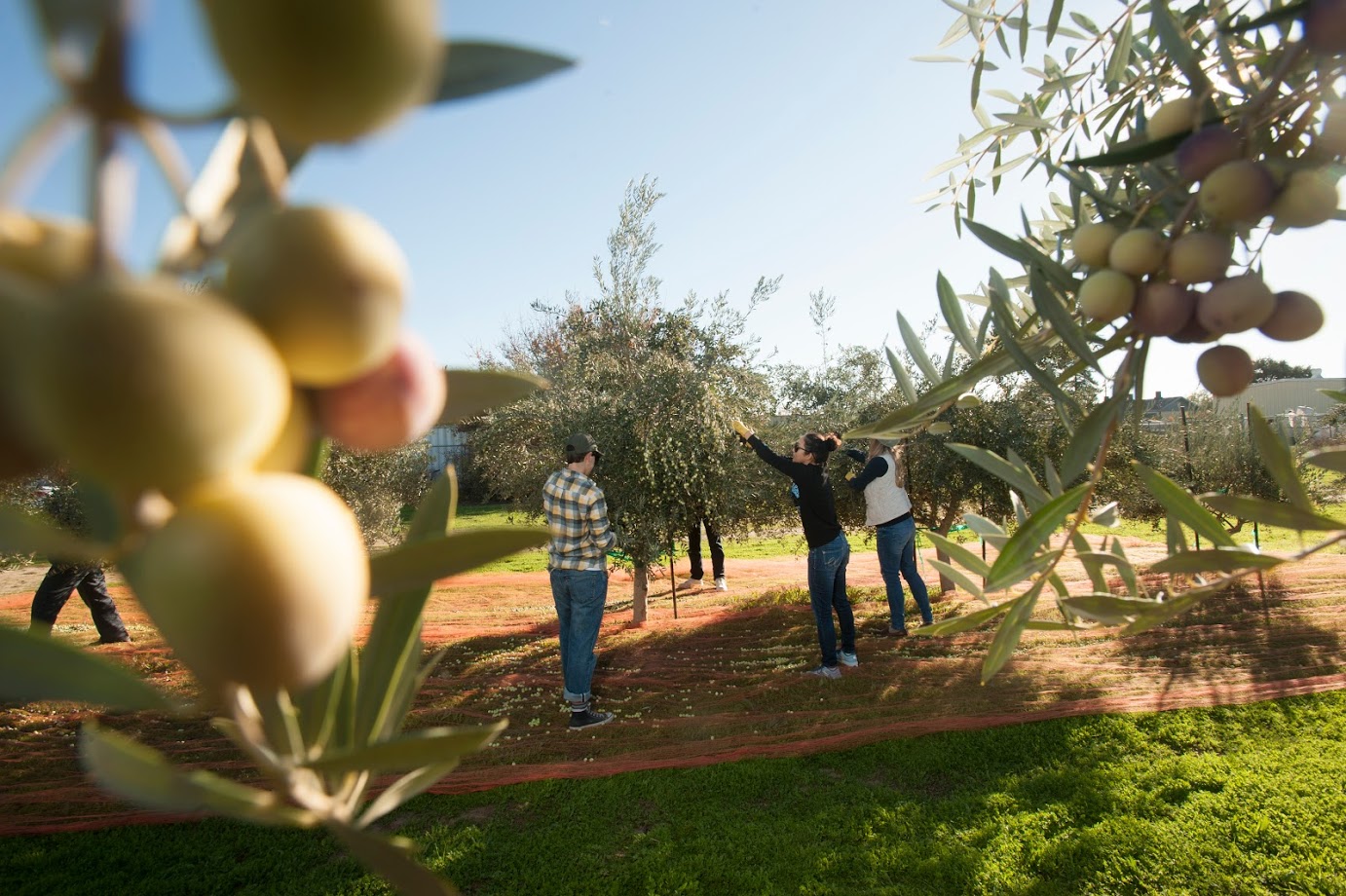Locally Sourced
UC Davis students try their hand at harvesting olives from campus research groves
Quality olive oil starts with freshly picked olives, rushed to the mill for pressing. In late November, UC Davis students got a taste of the effort involved in harvest by hand-gathering fruit from olive trees at campus research groves.
“I’m amazed at the sheer number of olives it takes to produce a small amount of olive oil,” said Lauren Crawford, a food science graduate student who helped with the harvest. Crawford’s research at the UC Davis Olive Center lab centers on developing an enzymatic debittering process for table olives, one that doesn’t produce toxic waste water like traditional lye-based methods.
Crawford and other volunteers who helped with the labor-intensive olive harvest gleaned the fruit that remained on trees after the mechanical harvester had made the first pass. They also collected olives from young trees too small to withstand the automated harvest process.
“The harvest is a fun event for students to get out of the library or the classroom and do what people have been doing for thousands of years—hand-picking olives,” said Dan Flynn, executive director of the UC Davis Olive Center. Now a self-funded research and education center, the Olive Center seeks to do for olives what UC Davis research has done for wine—increase the quality, viability, and sustainability of the industry.
Solving a messy problem

The unusual genesis of the Olive Center, established in 2008, has become part of campus lore. Olives dropped from Russell Boulevard trees onto campus paths, made a slippery mess, and caused bicycle accidents. The campus grounds division decided to harvest the olives and turn them into UC Davis olive oil. Dan Flynn prepared a study to see whether making and selling olive oil collected from Russell Boulevard trees would be financially feasible, and the first batch of UC Davis olive oil was an instant hit at Picnic Day.
But harvesting the large olive trees alongside traffic proved problematic, and eventually the grounds division solved the fruit-drop problem by pruning back the old trees on campus.
Dan Flynn, however, recognized that there was a need to address the research and education needs of the California olive industry, and the UC Davis Olive Center was formed at the Robert Mondavi Institute for Wine and Food Science. Since that time, the center has worked with faculty on more than a hundred research projects, produced more than 40 short courses, and mentored dozens of graduate students and undergraduate interns.
The center’s finding that most olive oil sold in the U.S. did not meet extra virgin standards drove a global debate on olive oil quality, a story that continues to reverberate today and has boosted awareness of the UC Davis impact on the olive industry.
Research groves
In collaboration with faculty, the Olive Center planted 20 varieties on a two-acre campus grove west of Highway 113, which is being managed organically. They also planted nine varieties of olives at the UC Davis Wolfskill Experimental Orchards in nearby Winters, which has existing olive trees more than 150 years old. This was the first year that the newly planted Wolfskill grove produced fruit for harvest.
Although the Olive Center has branched out beyond olive oil production, Flynn and his staff still produce the popular homegrown product, now sold through the UC Davis Stores, along with other olive-based products that help support the center and its research. This year was a bumper crop for UC Davis olives, with 18 tons of olives collected by mechanical harvesters and volunteers over three days, producing nearly 9,000 bottles of extra virgin olive oil.
Shirley Li, assistant director of the Olive Center, helped organize student and community volunteers for the harvest. Li completed her master’s degree in food science at UC Davis in 2013, and her research focused on the effects of cold storage conditions on extra virgin olive oil—which is the highest quality and most expensive olive oil classification.
This year was Li’s fourth olive harvest. “Participating in the harvest helps me to understand more about the oil, and how to handle the olives to keep the quality high,” said Li, who also works in the lab, the olive oil sensory panel, and helps organize Olive Center short courses. “It’s more down-to-earth than the lab.”
UC Davis olive oil and related products can be purchased at the UC Davis Stores or online.
Media contact(s):
- Dan Flynn, Executive Director, UC Davis Olive Center, 530-752-5170, jdflynn@ucdavis.edu
- Shirley Li, Assistant Director, UC Davis Olive Center, 530-752-3176, spsli@ucdavis.edu
- Robin DeRieux, Senior Writer, CA&ES Dean’s Office, 530-752-8244, rderieux@ucdavis.edu